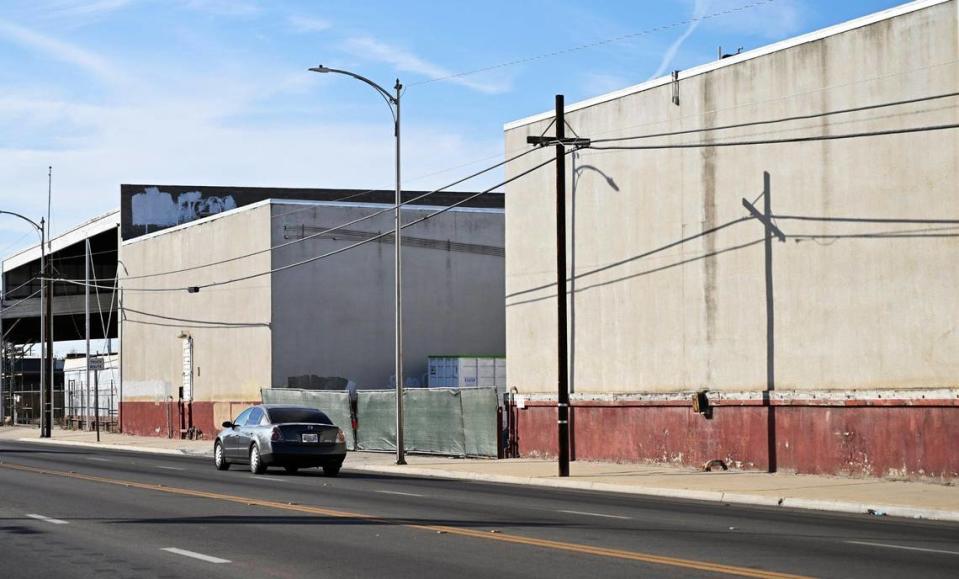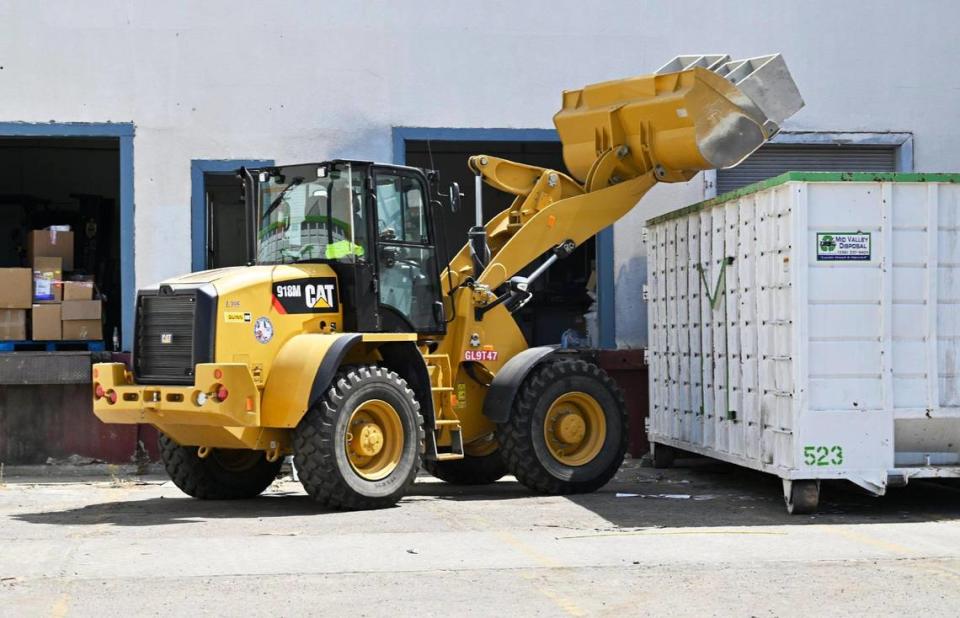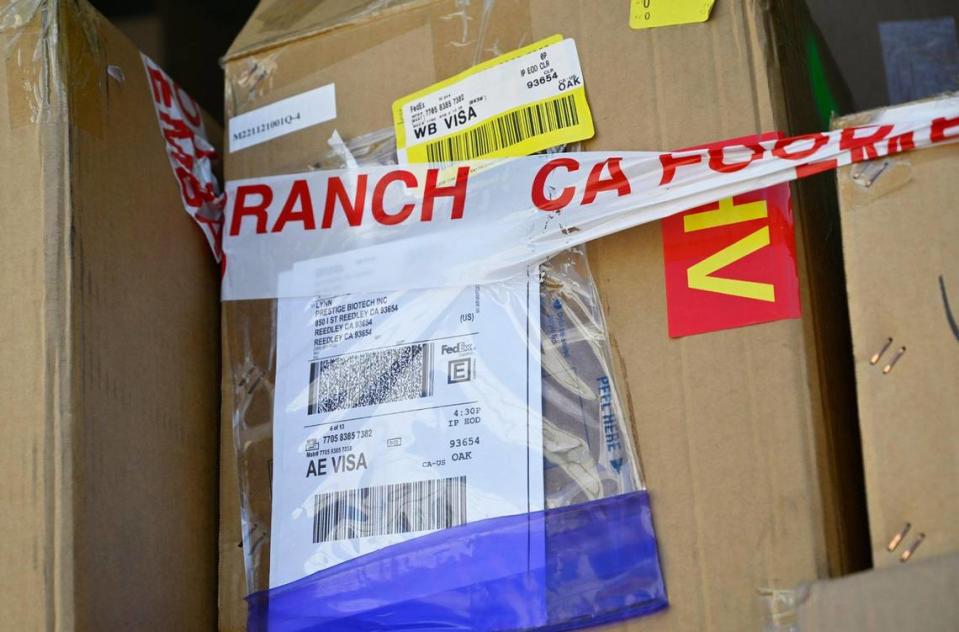Federal bill would track deadly virus sales, try to prevent repeat of illegal Reedley lab
- Oops!Something went wrong.Please try again later.
More than a year after the city of Reedley first encountered state and federal roadblocks in dealing with an illegal biological laboratory, new federal legislation is aimed at better tracking who are the buyers of infectious disease pathogens and establishing a reference database for cities, counties and states.
The bill, introduced April 18 in Congress by Rep. Jim Costa, D-Fresno, would also provide a single federal office to coordinate requests for help from local governments when they encounter clandestine labs like the one discovered in late 2022 in Reedley – a facility in a downtown warehouse that has taken more than a year for city, county, state and federal agencies to clean up.
Costa’s HR 8065, titled the “Prevent Illegal Laboratories and Protecting Public Health Act,” is co-sponsored by Rep. Kevin Kiley, R-Rocklin, and has been referred to the House Committee on Energy and Commerce.
At a press conference Tuesday in Reedley, Costa said his bill was intended to plug a gap in federal oversight of labs that became apparent during the public health response to the discovery of the Chinese-owned lab business in a warehouse at 850 I St. in downtown Reedley. Inside were dozens of refrigerators and freezers full of bacterial, viral and parasitic disease agents including COVID-19, Hepatitis B and C, chlamydia, E. coli, streptococcus, rubella, Ebola and HIV, among others.
The bill in its initial version would require companies that sell “highly infectious agents” to maintain a log of all sales and purchasers, and mandate that the federal Department of Health & Human Services perform regular evaluations of “high-containment labs” to analyze capacity and potential risks. The federal agency would also be tasked with issuing national standards for the construction and maintenance of labs.
The legislation also calls for establishing a new “Public Health and Biosecurity Team” to serve as a single point of contact for state and local agencies on issues related to biological laboratories.
“When we got into this, what we discovered is that there were multiple agencies, both at the federal and state level, that had maybe some responsibility but not any direct responsibility” for dealing with illegal laboratories, Costa said Tuesday.
The discovery of the Reedley lab – and the lengthy and laborious efforts to clear the alarming array of infectious contagions and hazardous materials found inside – prompted a congressional investigation last fall by the Joint Select Committee on the Chinese Communist Party over the federal response.
In a November report, the committee blamed gaps in the U.S. regulatory framework for allowing a “wanted fugitive” to set up the illegal lab in Reedley. That report also criticized the U.S. Centers for Disease Control for failing to test many of the biological materials found inside the lab.
The congressman expressed cautious hope that, with bipartisan support, the bill could be scheduled for a committee hearing within the next couple of months. “Whether or not it’s possible to get it off the House floor before our August recess remains to be seen,” Costa said. He added that he’s reached out to California’s U.S. senators, Alex Padilla and Laphonsa Butler, about introducing an identical bill in the Senate to speed the process.
The bill would need to be passed in the House and Senate before advancing to President Biden to be signed into law. Costa said he believes the bill will go through changes as it works its way through the legislative process “to ensure that we get the very best protection for health and safety.”
“We’ve got to work on the legislation; we’ve got to do our best to get it to the president’s desk I hope before the end of this year,” Costa added.
The man investigators identified as the owner of the lab, Jia Bei Zhu – also known as David He – is a 62-year-old Chinese resident. He was arrested in October and faces federal charges of manufacturing and distributing misbranded medical devices and for making false statements to investigators. Zhu remains in the Fresno County Jail while the case is pending in the U.S. District Court in Fresno.
Zhu’s company, Universal Meditech Inc., operated legally for a time – first in Tulare, and later in Fresno, before an apparent dispute with a landlord in Fresno prompted a hasty relocation to the Reedley warehouse to store the array of biological agents, laboratory mice, lab equipment, chemicals and thousands of kits to test for pregnancy, COVID and other conditions. Neither Universal Meditech nor Prestige Biotech Inc., an associated company, applied for or obtained a business license to operate in Reedley.
But the company was in the midst of plans to return to Fresno, in a buiding near the Fresno Yosemite International Airport, when the Reedley operation was shut down.

What difference would the bill make?
The bill’s requirement for a log of infectious-material sales “is an asset, a tool we did not have during this response,” said Joe Prado, assistant director of the Fresno County Department of Public Health. “That is significant for us to know: what’s in a building? What are we walking into, potentially? Who is the business owner? What credentials do they have? That log book is going to be key in any type of future response.”
Reedley City Manager Nicole Zieba said the bill “is the start of a much longer process.” Zieba recalled running into problems dealing with both federal and state agencies for assistance before she reached out to Costa’s office to break the bureaucratic logjam.
Ultimately, a cornucopia of agencies were engaged in the lab investigation and cleanup: the Federal Bureau of Investigation, U.S. Food & Drug Administration, the U.S. Environmental Protection Agency and Centers for Disease Control on the federal side, and state agencies including the California Department of Health Services and state Department of Toxic Substances Control.
“It allows for a single point of contact if any other city or county anywhere in this country runs into this ever again,” she said. “They don’t have to go through the trouble Reedley went through. They will have a single point of contact that will open up those doors (to other federal agencies) for them. … That alone could have really dramatically sped through the process for Reedley.
“We didn’t know that a situation like Reedley could exist until it did,” Zieba added. “Now that we do, we can … start closing those loopholes in federal law. And as we learn more, we can strengthen and add to this law.”
“This person that created what we determined was an illegal lab, the only thing they had to do was to apply for a city permit to open a business,” Costa said.
Zieba said the criminal charges Zhu faces illustrate the current weakness in the law. “The question I always get is, ‘What is this gentleman on trial for with regards to the infectious diseases?’” she said. “There are no charges against him for the infectious diseases because there are no laws in place right now.”
“It shocks people when I mention that we have learned you can buy infectious diseases on the internet,” Zieba added. “You can import infectious diseases with a permit, but once they’re here in America you can trade, sell or purchase infectious diseases. So to have a log where these things can be tracked and traced is critical.”
The congressional investigation “basically alerted the federal agencies … that illegal labs currently have a great leeway and little oversight in terms of their operations,” Costa said. “This really is a national security issue beyond being a public health and safety matter.”
Fresno City Councilmember Garry Bredefeld, who raised concerns last year over the lab and helped spearhead an effort to pass a local ordinance for inspection of biological laboratories in the city, hailed the new bill in a prepared statement.
“I applaud and greatly appreciate Congressman Costa taking affirmative actions in fixing the glaring holes in our public health system that will help stop foreign actors from creating and distributing deadly and dangerous materials to harm our citizens and our national security, which we witnessed with the dangerous lab in Reedley,” Bredefeld said.

What’s the current status of the warehouse?
“Most of what was in 850 I Street is gone,” Zieba said Tuesday, following months of cleanup and abatement efforts. About all that’s left are hundreds of thousands of testing kits that have been embargoed by state health officials for eventual removal and destruction.
“Everything else has been removed from that building, and my great expectation is that once that trial occurs, those test kits will be removed and the property owner will be able to return to their property,” Zieba said.
In March 2023, Reedley city officials and Fresno County health inspectors ordered the warehouse on I Street – in the heart of downtown and within blocks of the city hall, police department and a school – closed as unsafe to occupy.
In the intervening months, several court-ordered abatement efforts took place. The warehouse had contained nearly 1,000 laboratory mice that were being kept in crowded and unsanitary conditions. By mid-April, more than 175 of the mice were already dead; the surviving 773 rodents were euthanized because of their distressed physical condition.
In July, county health officials worked under a court order to clear out the various biological materials and medical waste, as well as containers and equipment that were contaminated. More than 125 containers, each holding 44 gallons of biological material and waste, were removed from the property over three days in July.
Thirty-six refrigerators and freezers were moved from the building for dismantling and disposal.
Earlier this year, more than 800 containers of laboratory chemicals were removed from the warehouse by the U.S. Environmental Protection Agency.
The owner of the property, Oakland-based AY-NC LP, agreed earlier this year to pay more than $260,000 to the city of Reedley and Fresno County to cover the two agencies’ costs for the months-long cleanup of the warehouse.


